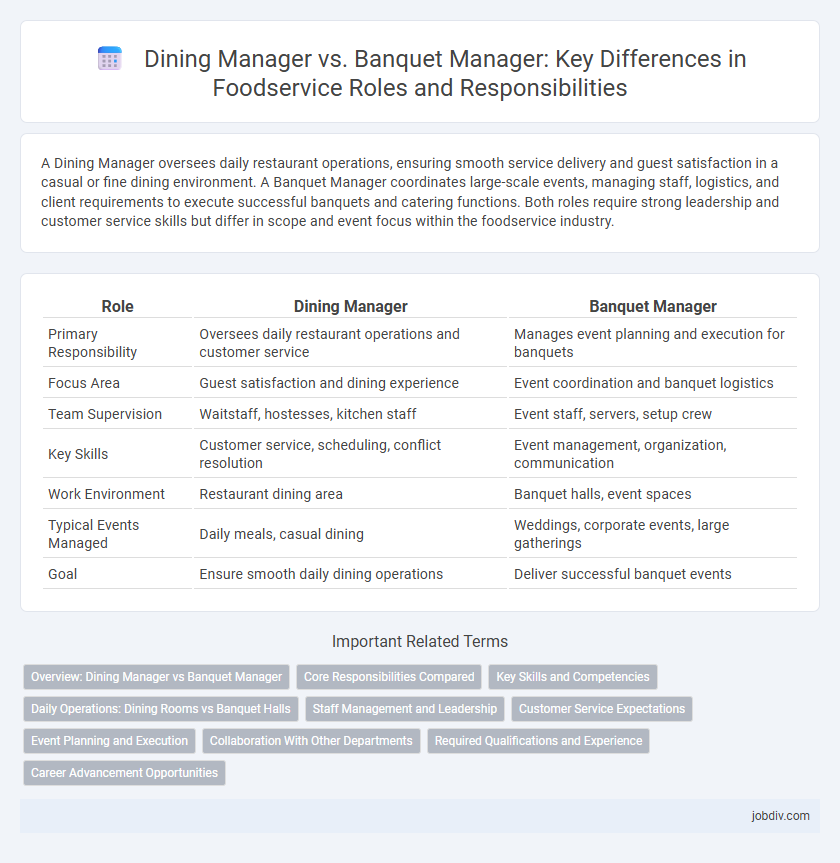A Dining Manager oversees daily restaurant operations, ensuring smooth service delivery and guest satisfaction in a casual or fine dining environment. A Banquet Manager coordinates large-scale events, managing staff, logistics, and client requirements to execute successful banquets and catering functions. Both roles require strong leadership and customer service skills but differ in scope and event focus within the foodservice industry.
Table of Comparison
| Role | Dining Manager | Banquet Manager |
|---|---|---|
| Primary Responsibility | Oversees daily restaurant operations and customer service | Manages event planning and execution for banquets |
| Focus Area | Guest satisfaction and dining experience | Event coordination and banquet logistics |
| Team Supervision | Waitstaff, hostesses, kitchen staff | Event staff, servers, setup crew |
| Key Skills | Customer service, scheduling, conflict resolution | Event management, organization, communication |
| Work Environment | Restaurant dining area | Banquet halls, event spaces |
| Typical Events Managed | Daily meals, casual dining | Weddings, corporate events, large gatherings |
| Goal | Ensure smooth daily dining operations | Deliver successful banquet events |
Overview: Dining Manager vs Banquet Manager
Dining Managers oversee daily restaurant operations, ensuring exceptional customer service, staff management, and inventory control to optimize guest satisfaction and profitability. Banquet Managers coordinate large-scale events, managing event setup, staff scheduling, and guest services to deliver seamless banquet experiences. Both roles require strong leadership and organizational skills but differ in scope, with Dining Managers focused on continuous service and Banquet Managers on event-specific execution.
Core Responsibilities Compared
A Dining Manager oversees daily operations of registered dining areas, ensuring exceptional customer service, managing staff schedules, and maintaining compliance with health and safety standards. In contrast, a Banquet Manager focuses on planning and executing large-scale events, coordinating with clients, managing banquet staff, and ensuring all event specifications are met. Both roles require strong leadership and organizational skills but differ primarily in scope, with Dining Managers handling routine service and Banquet Managers orchestrating specialized event experiences.
Key Skills and Competencies
A Dining Manager excels in customer service excellence, team leadership, and operational efficiency to ensure seamless daily restaurant functions and guest satisfaction. Key competencies include staff training, inventory management, and conflict resolution to maintain high standards in food quality and service speed. In contrast, a Banquet Manager specializes in event planning, coordination, and client communication, with skills in logistics management, budget oversight, and vendor negotiation to execute successful large-scale events and banquets.
Daily Operations: Dining Rooms vs Banquet Halls
Dining Managers oversee daily operations in dining rooms, ensuring smooth service flow, table settings, and guest satisfaction during regular meal periods. Banquet Managers coordinate banquet hall setups, manage event schedules, and supervise staff to deliver seamless experiences during large gatherings or special events. Both roles require strong organizational skills but differ in focus: Dining Managers optimize routine dining services while Banquet Managers handle occasional, large-scale functions.
Staff Management and Leadership
A Dining Manager oversees daily restaurant staff operations, ensuring seamless front-of-house service and efficient table turnover to maximize guest satisfaction. A Banquet Manager leads large event teams, coordinating servers, setup crews, and coordinating with kitchen staff to execute banquet functions flawlessly. Both roles require strong leadership skills, but Banquet Managers often handle more complex staff coordination and logistical challenges during high-volume events.
Customer Service Expectations
Dining Managers prioritize seamless day-to-day restaurant operations, ensuring high-quality customer service through attentive staff management and timely resolution of guest concerns. Banquet Managers focus on coordinating large-scale events, guaranteeing personalized service and meticulous attention to client requirements for a flawless event experience. Both roles demand strong communication skills and a customer-centric approach to enhance overall guest satisfaction in foodservice settings.
Event Planning and Execution
Dining Managers oversee daily restaurant operations, ensuring seamless service and customer satisfaction, while Banquet Managers specialize in coordinating large-scale events, managing logistics from setup to breakdown. Event planning in banquet management involves detailed scheduling, vendor coordination, and tailored menu planning to meet client specifications, whereas Dining Managers focus on optimizing regular dining service workflows and staff management. Both roles require strong leadership and communication skills, but Banquet Managers prioritize execution of one-time or recurring events with complex logistical demands.
Collaboration With Other Departments
Dining managers coordinate closely with kitchen staff, front-of-house teams, and suppliers to ensure seamless daily service and optimize guest satisfaction. Banquet managers collaborate extensively with event planners, catering teams, and audiovisual departments to execute large-scale functions and special events flawlessly. Both roles rely on strong interdepartmental communication to align operational objectives and deliver exceptional dining experiences.
Required Qualifications and Experience
Dining Managers typically require a strong background in restaurant operations, including experience in staff supervision, customer service, and inventory management, often demanding 3-5 years in a similar role. Banquet Managers need expertise in event planning, coordination, and catering services, with an emphasis on logistics and client relations, usually requiring 4-6 years in banquet or hospitality event management. Both positions benefit from strong leadership skills, proficiency in scheduling software, and a certification in hospitality management or food safety.
Career Advancement Opportunities
Dining Managers often have broader career advancement opportunities due to their focus on daily restaurant operations, staff management, and customer service, making them well-suited for roles like Director of Food and Beverage or Regional Operations Manager. Banquet Managers specialize in coordinating large events and banquets, which can lead to progression into event planning director roles or facility management positions within hospitality venues. Both roles require strong leadership and organizational skills but offer distinct career paths based on operational scope and event management expertise.
Dining Manager vs Banquet Manager Infographic

 jobdiv.com
jobdiv.com